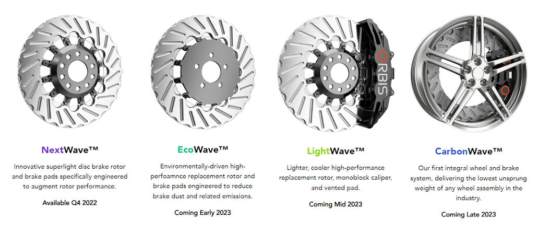Stop, the revolution: Orbis Brakes presents new innovation
 Orbis is working to bring 4 products to market (Image: Orbis Brakes)
Orbis is working to bring 4 products to market (Image: Orbis Brakes)
US start-up Orbis Brakes has launched brake technology developed in partnership with NASA which uses “advanced aerodynamics to provide superior surface cooling, reduce dangerous brake fade, and extend vehicle range and fuel efficiency.” The first product in Orbis Brakes’ Periodic Wave disc brake line will arrive in the third quarter of the year and is expected to “change the standard for price, performance, safety, and sustainability.”
Automotive braking technology has not altered significantly since the introduction of carbon-ceramic brakes 20 years ago. Orbis was looking at means of cooling brakes more efficiently when an engineer from NASA offered the space agency’s heat-dissipation expertise. The ensuing partnership resulted in the patented Periodic Wave disc brake.
“This is a collaboration of some of the smartest people on the planet,” says Marcus Hays, co-chief executive officer and co-founder of Orbis. “We decided from the beginning that it wasn’t innovation unless it produced real-world results, and that’s exactly what we’ve done.”
Racetrack performance at consumer prices
Orbis claims its brakes are “lighter, cooler, and vastly more efficient,” and anticipates that they will “deliver the kind of market disruption carbon-ceramic brakes couldn’t: racetrack performance at consumer prices.”
The company describes its first product, the NextWave, as an “innovative superlight disc brake rotor and pad expected to retail at a fraction of comparable performance brakes.” It will follow this up in the first quarter of 2023 with the EcoWave, an “environmentally-driven high-performance replacement brake rotor and pad priced to compete with entry-level brakes.” The company will also introduce LightWave, the “lighter, cooler, high-performance replacement rotor, monoblock calliper, and vented pad,” and CarbonWave, the “world’s first integral wheel and brake, delivering the lowest unsprung weight in the industry.”
Environmental benefit
While performance, safety, and price are key values in any braking equation, Orbis Brakes says it has added another revolutionary advantage: lower environmental impact. The Orbis brake weighs 50 per cent less on average than conventional cast iron brakes, reducing the energy needed to manufacture them by half and lowering carbon consumption across the supply chain. According to Orbis Brakes, a global upgrade to Periodic Wave brakes could “remove billions of pounds of CO2 from the atmosphere.”
Made from 100 per cent recyclable iron, the unique design also dramatically reduces brown emissions, the particulate matter from brakes, tyres, and road surfaces.




Comments